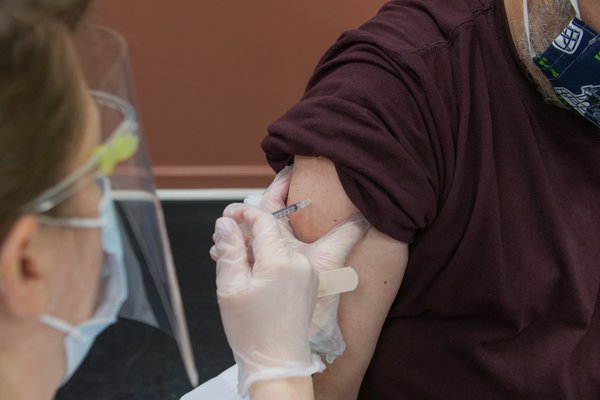The Trump administration is making sweeping changes to its COVID-19 vaccine protocols in an effort to expedite a rollout that has fallen behind schedule.
New federal guidelines will advise states to begin vaccinating adults ages 65 and older, as well as people with underlying health conditions, Health and Human Services Secretary Alex Azar said Tuesday on ABC's "Good Morning America."
- RELATED COVERAGE
- Gloucester County's COVID-19 vaccination mega-site will have capability of inoculating 2,400 people per day
- Pfizer's COVID-19 vaccine effective against U.K. variant, study suggests
- Philly residents now can pre-register to receive a COVID-19 vaccine
The guidelines also will direct states to release all available vaccine doses, rather than holding some in reserve. Vaccine production capabilities are now sufficient to guarantee a timely booster shot without holding supplies in reserve, Azar said.
"We had been holding back second doses as a safety stock," Azar said. "We now believe that our manufacturing is predictable enough that we can ensure second doses are available for people from ongoing production, so everything is now available to our states and our health care providers."
The new federal immunization protocols, expected to be released later Tuesday, also call for expanding vaccination sites to community health centers and pharmacies.
The decision to revise vaccine recommendations comes as Operation Warp Speed, the entity tasked with developing and distributing a coronavirus vaccine, faces criticism for a slow rollout.
Federal health officials are hopeful that releasing more COVID-19 vaccine doses will bring the U.S. closer to herd immunity and ending the pandemic. They are confident that the vaccine supply will rapidly increase, ensuring recipients receive their booster shots as scheduled.
Though federal agencies issue guidelines for vaccine distribution, states have the authority to roll out vaccines as they see fit. Most have prioritized health care workers and nursing home staffers and residents — as initially recommended by the U.S. Centers for Disease Control and Prevention.
Florida and Texas already have made seniors and some people with pre-existing medical conditions eligible for a COVID-19 vaccine. Pennsylvania and New Jersey have not opened eligibility to those groups, though New Jersey is now vaccinating law enforcement officers and other first responders.
The new federal plan is similar to one endorsed by President-elect Joe Biden, who pledged to release all available doses when he takes office next week, according to CNN.
The two vaccines available each require a second dose to be considered fully effective.
The Pfizer vaccine requires a booster be given three weeks after the first shot. The second dose of the Moderna vaccine is given four weeks later.
About nine million Americans have received their first dose of a COVID-19 vaccine, according to the CDC. More than 25 million doses have been distributed so far by the federal government.
More than 285,000 Pennsylvania and 214,000 New Jersey residents have received at least one dose, according to the states' databases.
Follow Pat & PhillyVoice on Twitter: @Pat_Ralph | @thePhillyVoice
Like us on Facebook: PhillyVoice
Add Pat's RSS feed to your feed reader
Have a news tip? Let us know.


